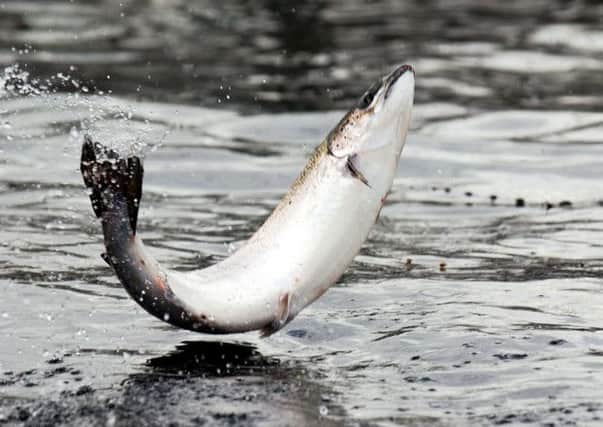Scots salmon numbers dwindle, catch limits urged


Evidence from angling, river netting and fish counters shows wild salmon numbers are at their lowest in decades.
Conservationists are blaming a recent rise in coastal netting operations for the sharp decline.
Advertisement
Hide AdAdvertisement
Hide AdMembers of the Salmon and Trout Association (Scotland), a game angling environmental charity, say its indiscriminate nature slashes the number of fish reaching river spawning grounds from the sea.
This year’s hot weather has also aggravated the problem, with low water levels hampering the movement of fish.
Salmon numbers recorded last month in the North Esk river, Scotland’s most closely monitored watercourse, were down a third on the five-year average.
Stocks in many other places have dropped to half their usual levels. This year’s figures come after sparse runs in 2013.
Scottish Government figures show 50 per cent more salmon were killed in nets last year than in 2012.
There are no official quotas set for catches of wild salmon, and so there is currently no way to limit how many are killed. The campaigners say the government has a “clear duty” to protect the fish and a ban on coastal netting should be imposed for the remainder of the season to help stocks. Scottish ministers need to intervene immediately to stop any further killing of salmon this season by coastal nets,” said the charity’s chairman Hugh Campbell Adamson.
“In recent weeks, salmon returning to the coast after their marine migrations have, because of low water levels in most rivers, been either reluctant or unable to enter their rivers of origin.
“Depleted stocks have meandered up and down the coast, where they have been highly vulnerable to the coastal nets.The government’s support for the netting industry and its failure to regulate or limit catches is now coming home to roost.
Advertisement
Hide AdAdvertisement
Hide Ad“Ministers have a clear duty to step in to prevent any further indiscriminate killing of our depleted and fragile stocks.”
Mixed-stock coastal netting stations catch any salmon passing by – regardless of where they are heading or the strength of populations in home rivers.
The Scottish Government’s 2001 Green Paper on Freshwater Fish and Fisheries states that “the exploitation of salmon outside their river of origin is widely accepted as contrary to good salmon management, primarily on the grounds that it does not discriminate between separate river populations and therefore severely inhibits monitoring and optimum management of exploitation of stocks on a catchment basis”.
A review of Scotland’s wild fisheries was launched in March, and could take six months.
A Scottish Government spokeswoman said: “We are less than two weeks away from the closure of the netting season and around six weeks to the end of the angling season. We are expecting the independent review in October and will consider this report and respond in due course.”
Netting is a much smaller industry than in its heyday – up to 500,000 salmon and grilse were killed annually until the 1980s.
SEE ALSO: